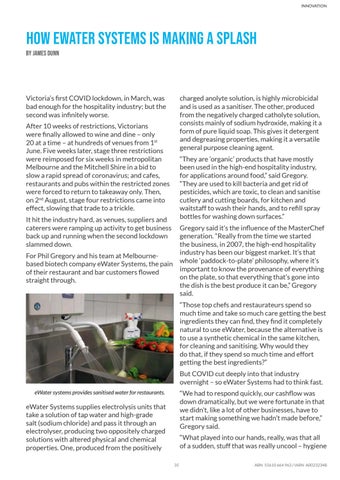INNOVATION
How eWater Systems is making a splash By James Dunn
charged anolyte solution, is highly microbicidal and is used as a sanitiser. The other, produced from the negatively charged catholyte solution, consists mainly of sodium hydroxide, making it a form of pure liquid soap. This gives it detergent and degreasing properties, making it a versatile general purpose cleaning agent.
Victoria’s first COVID lockdown, in March, was bad enough for the hospitality industry; but the second was infinitely worse. After 10 weeks of restrictions, Victorians were finally allowed to wine and dine – only 20 at a time – at hundreds of venues from 1st June. Five weeks later, stage three restrictions were reimposed for six weeks in metropolitan Melbourne and the Mitchell Shire in a bid to slow a rapid spread of coronavirus; and cafes, restaurants and pubs within the restricted zones were forced to return to takeaway only. Then, on 2nd August, stage four restrictions came into effect, slowing that trade to a trickle.
“They are ‘organic’ products that have mostly been used in the high-end hospitality industry, for applications around food,” said Gregory. “They are used to kill bacteria and get rid of pesticides, which are toxic, to clean and sanitise cutlery and cutting boards, for kitchen and waitstaff to wash their hands, and to refill spray bottles for washing down surfaces.”
It hit the industry hard, as venues, suppliers and caterers were ramping up activity to get business back up and running when the second lockdown slammed down.
Gregory said it’s the influence of the MasterChef generation. “Really from the time we started the business, in 2007, the high-end hospitality industry has been our biggest market. It’s that whole ‘paddock-to-plate’ philosophy, where it’s important to know the provenance of everything on the plate, so that everything that’s gone into the dish is the best produce it can be,” Gregory said.
For Phil Gregory and his team at Melbournebased biotech company eWater Systems, the pain of their restaurant and bar customers flowed straight through.
“Those top chefs and restaurateurs spend so much time and take so much care getting the best ingredients they can find, they find it completely natural to use eWater, because the alternative is to use a synthetic chemical in the same kitchen, for cleaning and sanitising. Why would they do that, if they spend so much time and effort getting the best ingredients?” But COVID cut deeply into that industry overnight – so eWater Systems had to think fast. eWater systems provides sanitised water for restaurants.
“We had to respond quickly, our cashflow was down dramatically, but we were fortunate in that we didn’t, like a lot of other businesses, have to start making something we hadn’t made before,” Gregory said.
eWater Systems supplies electrolysis units that take a solution of tap water and high-grade salt (sodium chloride) and pass it through an electrolyser, producing two oppositely charged solutions with altered physical and chemical properties. One, produced from the positively
“What played into our hands, really, was that all of a sudden, stuff that was really uncool – hygiene 35
ABN 55610 664 963 / IARN A0023234B














